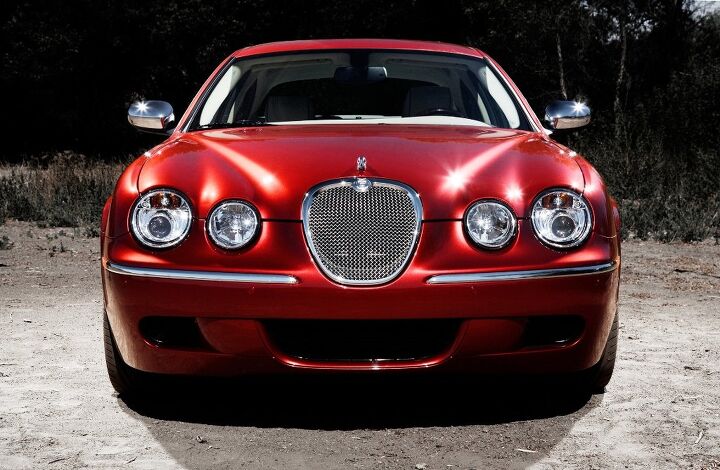Piston Slap: The Cat's Meow for OEM or Aftermarket Parts?

John writes:
I recently had a local shop confirm the need for O2 sensors in my Jaguar S-Type. With 97,000 miles on them, it seems very likely they need replacement, and the mechanic wants to install factory sensors at the cost of some $650 for the parts. I can purchase Denso or Bosch from the local parts store for less than $200. As these parts were originally designed to last at least 80,000 miles (Federal warranty requirement), I figure that replacements from any reputable source will last quite a long time.
What is your opinion as to brand specific parts versus more generic replacement parts?
I suspect the original supplier was actually Bosch anyway so in my mind they are the same.
Sajeev answers:
Your last sentence is my usual go-to statement, especially as cars depreciate to the age of any Jaguar S-Type. I still remember cringing when my trusted mechanic, some 15+ years ago, said my father’s Mark VIII’s (not the one I currently own) intermittent fuel smell was from leaky injectors. The replacement injectors cost $800, and they were a unique part number with no aftermarket alternative.
Perhaps that’s what he thought since it was the first Ford with that particular engine, but it was all bullshit: all Fords with that engine use the same 24 lb-hr injectors. I grabbed my Ford Motorsport catalog and ordered a set for $275-ish, delivered to the shop, and crossed my fingers for a seamless install. Thank goodness I was right.
Back to the “value” of factory vs. aftermarket parts on a heavily depreciated motor: it really depends. Factory body parts? Yes. In this case? No, get Bosch O2 sensors and pocket the extra cash.
Forget about the price, odds are they are the original equipment manufacturer (OEM) anyway. Sometimes you’ll even get a factory part when buying the “aftermarket” brand: happened to me when purchasing TRW control arms and several HVAC parts. And it’s nice to see those factory castings, part numbers or packaging when you’d never pay for them. It’s kinda like poppin’ tags, sort of.
When do you buy OEM bits, Best and Brightest?
[Image: Jaguar]
Send your queries to sajeev@thetruthaboutcars.com. Spare no details and ask for a speedy resolution if you’re in a hurry…but be realistic, and use your make/model specific forums instead of TTAC for more timely advice.

More by Sajeev Mehta
Latest Car Reviews
Read moreLatest Product Reviews
Read moreRecent Comments
- Mike Beranek While the product may appear to be "better", only time will tell. The American automotive environment can chew a car up and spit it out. Will these Chinese EVs survive like a quarter-century old Cavalier, or will they turn out like VinFast's "cars"?
- Mike Beranek This police vehicle will be perfect for when the State of Florida starts tracking every pregnancy.
- Dave M. The Highlander hybrid, a larger, heavier vehicle, gets better mpgs. Why? Also, missed opportunity - if Toyota had made this a hatchback, they could have scooped up the "want a Tesla S but not ready for a full EV" crowd, however small or large they may be....
- TheMrFreeze Difficult call...the more the mainstream automakers discontinue their more affordable models and only sell crazy overpriced EVs and trucks, the more appealing the idea of letting in cheap imported cars becomes with the buying public. If the government is going to impose tariffs on Chinese vehicles, at the same time they need to be getting with the Big 3 and telling them to fill the void with affordable models and not use the tariff as an excuse to simply raise prices. Otherwise, public pressure could see the tariffs withdrawn.I seem to recall the last administration put a 25% tariff on Chinese steel, at which point the US manufacturers immediately used the opportunity to raise their prices 25%...that needs to not happen.
- Daniel J The real problem I see is it's about 8K too much. I'd prefer a lower trim but they don't offer enough HP for my tastes.

































Comments
Join the conversation
Plus, it's Bosch. It's not some no-name outfit you've never heard of (which, itself, probably wouldn't be the end of the world). Buy them.
My Mazda 5 had quite a few suspension issues early on. I replaced all the Mazda stuff that had issues with non OEM stuff. No problems in the 25k since most of the work done, on PA's awful roads with mostly city driving. I've found that every so often, the OEM stuff is the best bet. The rear wiper on the Mazda 5 is a Mazda only part, all the aftermarket blades don't work well, leaving a large area uncleared. It's worth the $20 every two years for the properly functioning part.